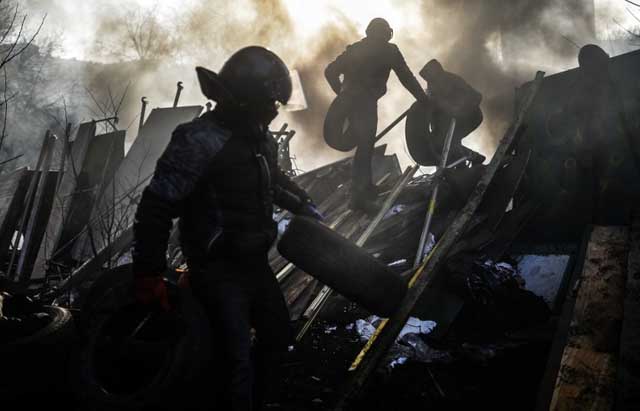SUMMARY
This is AI generated summarization, which may have errors. For context, always refer to the full article.

MOSCOW, Russia (UPDATED) – Russian Foreign Minister Sergei Lavrov on March 8, Saturday, called for an OSCE investigation into who was behind the deaths of dozens of people in Kiev last month in attacks by snipers, saying the truth could no longer be “covered up.”
Lavrov’s comments came after Estonia’s top diplomat told EU foreign policy chief Catherine Ashton in a phone call leaked this week that the then-Ukrainian opposition to president Viktor Yanukovych may have been involved in the attacks.
The leaked call has been played up by Russian state media over the last few days and Lavrov’s comments were the latest sign Moscow wants to use the sniper controversy as an argument to discredit Ukraine’s new authorities.
“The latest information about the so-called snipers case can no longer be covered up,” Lavrov told a news conference in Moscow with his Tajik counterpart.
“We have proposed that the Organisation for Security and Cooperation in Europe (OSCE) takes up an objective investigation of this and we will ensure there is justice.
“There have been too many lies, and this lie has been used too long to push European public opinion in the wrong direction, contrary to the objective facts.”
Western states have blamed Yanukovych’s now disbanded elite riot police force for much of the killing that rocked Kiev in February.
However Russia has strongly emphasised the leaked phone call between Estonian Foreign Minister Urmas Paet and Ashton as evidence for its argument that the new post-Yanukovych government in Kiev is made up of dangerous extremists.
“If all those things were to be investigated, then, I think, a completely different picture would be drawn compared to what is being depicted by American media and, unfortunately, by some American and European politicians,” Russia’s ambassador to the UN Vitaly Churkin told the state-run English language RT channel.
The new anti-Yanukovych Ukrainian government has meanwhile implied that Russia may have itself had a hand in the bloodshed.
Moscow’s call for an OSCE investigation comes as unarmed observers from the same organisation have been blocked from entering Crimea on three separate occasions. On Saturday they were stopped after shots were fired as they approached a checkpoint manned by pro-Russian forces.
Have you not heard?
In the audio of the February 26 call, whose authenticity was confirmed by Estonia, Paet told Ashton he was informed in Kiev that “they were the same snipers killing people from both sides”.
Dozens of protesters and around 15 police officers were killed in the attacks.
Paet, who had held talks with Ukraine’s new leaders on February 25, added: “It’s really disturbing that now the new coalition, they don’t want to investigate what exactly happened.”
Ashton sounds taken aback by his remarks: “I think we do want to investigate. I mean I didn’t know. I didn’t pick that up. Gosh.”
Russian President Vladimir Putin had appeared to allude to the controversy in his news conference on Tuesday, a day before the audio tape was posted on Wednesday.
“Have you not heard that now there is the opinion… that these (snipers) were provocateurs from one of the opposition parties? Have you not heard about that?” Putin asked a reporter, saying the information was available on “open sources”.
The release of the tape echoed another tape leaked in February when US Assistant Secretary of State Victoria Nuland and US ambassador to Kiev, Geoff Pyatt, were heard discussing which opposition figures should be in a new Ukrainian government.
Nuland also used colourful language to criticise the EU, exposing tensions with the bloc at a crucial time. The source of the tape was never made clear but US officials strongly implied Russia was to blame.
The Estonian foreign ministry said it rejected the claim that Paet was “giving an assessment of the opposition’s involvement in the violence”.
“The fact that this phone call has been leaked is not a coincidence,” it quoted Paet as saying. – Rappler.com
Add a comment
How does this make you feel?
There are no comments yet. Add your comment to start the conversation.